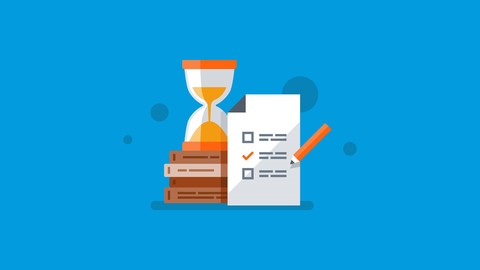
Ace your SAT and SAT Subject Test
Ace your SAT and SAT Subject Test, available at $19.99, has an average rating of 3, with 15 lectures, based on 2 reviews, and has 210 subscribers.
You will learn about Understand the SAT structure and be able to plan out an effective study schedule in a short time This course is ideal for individuals who are Any and all interested in taking or teaching SAT It is particularly useful for Any and all interested in taking or teaching SAT.
Enroll now: Ace your SAT and SAT Subject Test
Summary
Title: Ace your SAT and SAT Subject Test
Price: $19.99
Average Rating: 3
Number of Lectures: 15
Number of Published Lectures: 15
Number of Curriculum Items: 15
Number of Published Curriculum Objects: 15
Original Price: $199.99
Quality Status: approved
Status: Live
What You Will Learn
- Understand the SAT structure and be able to plan out an effective study schedule in a short time
Who Should Attend
- Any and all interested in taking or teaching SAT
Target Audiences
- Any and all interested in taking or teaching SAT
The SAT, SAT Subject Tests, and ACT are standardized exams commonly used for college admissions in the United States. By understanding the differences between the SAT, SAT Subject Tests, and ACT, assessing your strengths, and creating a personalized study plan, you can set yourself up to achieve your desired score on these standardized tests. Here is a holistic overview and comparison of these tests to help you decide which one is right for you, along with tips for self-assessment and creating a study plan:
SAT:
-
The SAT is a general test that assesses critical thinking skills in math, evidence-based reading, and writing.
-
It includes an optional essay section.
-
The total score ranges from 400 to 1600.
SAT Subject Tests:
-
SAT Subject Tests are specific exams in individual subjects like Math, Biology, Chemistry, etc.
-
They are required by some colleges for specific programs or majors.
-
Each test is scored on a scale of 200-800.
ACT:
-
The ACT is an alternative to the SAT and consists of sections in English, Math, Reading, and Science, with an optional essay.
-
The total score ranges from 1 to 36.
Comparison:
-
The SAT and ACT have different formats and scoring scales, so it’s essential to understand your strengths and preferences before choosing one.
-
Some students may perform better on one test over the other due to their testing style and content focus.
Tips for Self-Assessment and Choosing a Test:
-
Take practice tests for both the SAT and ACT to see which one you are more comfortable with.
-
Consider your strengths in different subject areas to determine which test aligns better with your skills.
Creating a Study Plan:
-
Set a realistic timeline leading up to your test date.
-
Identify your weak areas and focus on improving them.
-
Utilize study resources like prep books, online courses, and practice tests.
-
Take breaks and prioritize self-care to avoid burnout.
By understanding the differences between the SAT, SAT Subject Tests, and ACT, assessing your strengths, and creating a personalized study plan, you can set yourself up to achieve your desired score on these standardized tests.
Course Curriculum
Chapter 1: Basics
Lecture 1: What is SAT
Lecture 2: SAT vs ACT
Lecture 3: What are SAT Subject Tests
Lecture 4: SAT vs SAT Subject Test
Lecture 5: Which Test is for You!
Chapter 2: SAT – Test Constitution
Lecture 1: SAT At A Glance
Lecture 2: Scoring
Chapter 3: SAT Subject Test – Test Constitution
Lecture 1: Subjects offered
Lecture 2: Knowing the Test
Lecture 3: Scoring
Chapter 4: Preparation and Study Plan
Lecture 1: Self Assessment
Lecture 2: Study Plan
Lecture 3: The Dos and Don'ts
Lecture 4: Resources Available
Chapter 5: Sum Up
Lecture 1: Final Words
Instructors
-
Peace.University USA
Learning Matters!
Rating Distribution
- 1 stars: 1 votes
- 2 stars: 0 votes
- 3 stars: 0 votes
- 4 stars: 0 votes
- 5 stars: 1 votes
Frequently Asked Questions
How long do I have access to the course materials?
You can view and review the lecture materials indefinitely, like an on-demand channel.
Can I take my courses with me wherever I go?
Definitely! If you have an internet connection, courses on Udemy are available on any device at any time. If you don’t have an internet connection, some instructors also let their students download course lectures. That’s up to the instructor though, so make sure you get on their good side!
You may also like
- Best Yoga Instruction Courses to Learn in March 2025
- Best Stress Management Courses to Learn in March 2025
- Best Mindfulness Meditation Courses to Learn in March 2025
- Best Life Coaching Courses to Learn in March 2025
- Best Career Development Courses to Learn in March 2025
- Best Relationship Building Courses to Learn in March 2025
- Best Parenting Skills Courses to Learn in March 2025
- Best Home Improvement Courses to Learn in March 2025
- Best Gardening Courses to Learn in March 2025
- Best Sewing And Knitting Courses to Learn in March 2025
- Best Interior Design Courses to Learn in March 2025
- Best Writing Courses Courses to Learn in March 2025
- Best Storytelling Courses to Learn in March 2025
- Best Creativity Workshops Courses to Learn in March 2025
- Best Resilience Training Courses to Learn in March 2025
- Best Emotional Intelligence Courses to Learn in March 2025
- Best Time Management Courses to Learn in March 2025
- Best Remote Work Strategies Courses to Learn in March 2025
- Best Freelancing Courses to Learn in March 2025
- Best E-commerce Strategies Courses to Learn in March 2025






















